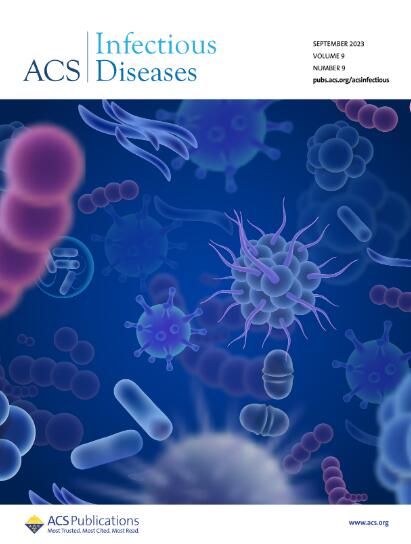纪念罗伯特·e·w·汉考克:微生物学和传染病研究创新的遗产。
IF 4
2区 医学
Q2 CHEMISTRY, MEDICINAL
引用次数: 0
摘要
本文章由计算机程序翻译,如有差异,请以英文原文为准。
Honoring Robert E. W. Hancock: A Legacy of Innovation in Microbiology and Infectious Disease Research.
求助全文
通过发布文献求助,成功后即可免费获取论文全文。
去求助
来源期刊

ACS Infectious Diseases
CHEMISTRY, MEDICINALINFECTIOUS DISEASES&nb-INFECTIOUS DISEASES
CiteScore
9.70
自引率
3.80%
发文量
213
期刊介绍:
ACS Infectious Diseases will be the first journal to highlight chemistry and its role in this multidisciplinary and collaborative research area. The journal will cover a diverse array of topics including, but not limited to:
* Discovery and development of new antimicrobial agents — identified through target- or phenotypic-based approaches as well as compounds that induce synergy with antimicrobials.
* Characterization and validation of drug target or pathways — use of single target and genome-wide knockdown and knockouts, biochemical studies, structural biology, new technologies to facilitate characterization and prioritization of potential drug targets.
* Mechanism of drug resistance — fundamental research that advances our understanding of resistance; strategies to prevent resistance.
* Mechanisms of action — use of genetic, metabolomic, and activity- and affinity-based protein profiling to elucidate the mechanism of action of clinical and experimental antimicrobial agents.
* Host-pathogen interactions — tools for studying host-pathogen interactions, cellular biochemistry of hosts and pathogens, and molecular interactions of pathogens with host microbiota.
* Small molecule vaccine adjuvants for infectious disease.
* Viral and bacterial biochemistry and molecular biology.
 求助内容:
求助内容: 应助结果提醒方式:
应助结果提醒方式:


